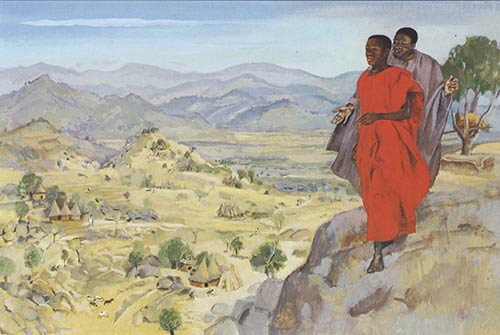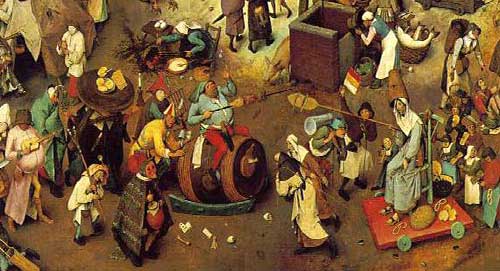
Collect for Lent 1
Let us pray (in silence) [to follow Christ more closely]
pause
God of the desert,
Jesus was led by the Spirit
to fast forty days in the wilderness
and was tempted as we are, yet without sin;
give us grace to observe the disciplines of Lent;
and, as you know our weakness,
so may we know your power to save;
through Jesus Christ our Redeemer,
who is alive with you and the Holy Spirit,
one God now and for ever.
Amen.
Sadly (and surprisingly), on the First Sunday in Lent, a day that so many churches and denominations celebrate the same event with the same readings, we do not have a shared collect. My collect attempts to draw from several different ones into a coherent whole.
Here is my commentary for this collect for Lent 1 or below.
Resources off this site
Resourcing Preaching Down Under
Textweek resources
Girardian lectionary reflection
Greek lectionary resource

Shrove Tuesday
The Tuesday before Ash Wednesday
“Shrove” is the past tense of the verb “shrive” – “to obtain absolution for oneself by confessing and doing penance”.
In French this is Mardi Gras – “fat Tuesday” – the feasting before Lenten fasting. A time of “carnival” [The derivation of the word “carnival” is uncertain. Possibly it originates in the Latin carne vale, meaning “to farewell meat” or even “to say goodbye to the flesh”. Others posit that its origin lies in the Italian carne levare, meaning “to remove meat”. The Oxford English Dictionary has that “Carnival” is derived from Latin carnem levare (removal of the meat) or carnem laxare (leaving the meat).]
In the Northern Hemisphere, it is Springtime, And, I presume that, in order to have chicks, one must leave the eggs with the hen to hatch. You stop eating the eggs during this Northern Hemisphere Springtime, when the days lengthen (the origin of the word “Lent”). Once enough chicks have hatched, they can start eating eggs again at Easter time – the origin of Easter eggs. In the quaint manner of liturgical developments, not eating eggs during Lent means one gets rid of all the eggs before Lent! Hence, the development of Pancake Tuesday – of using up all our eggs by eating pancakes on Shrove Tuesday.
The context of Northern Hemisphere Spring became the frame of Lent. They ate less, because, at this time of year, waiting for harvests, there was less to eat.
Our contexts are Covid, and in some places war, or other tragedies. What is my appropriate response, your particular response, to prepare, these 40 days, for the the devastation of Good Friday and for the Great News of Easter Day?
This is the last day of the “Alleluias” until Easter. This day may even involve the burying of the Alleluia.
A hymn for Shrove Tuesday
Alleluia, song of gladness,
hymn of endless joy and praise.
Alleluia is the worship
that celestial voices raise
and, delighting in God’s glory,
sing in heaven’s courts always.
Alleluia, blessed Salem,
home of all our hopes on high.
Alleluia, sing the angels;
Alleluia, saints reply;
but we, for a time on this earth,
chant a simpler melody.
Alleluias we now forfeit
in this holy time of Lent.
Alleluias we relinquish
as we for our sins repent,
trusting always in God’s mercy
and in Love omnipotent.
Blessed Trinity of Glory,
hear your people as we pray.
Grant that we may know the Easter
of the Truth, the Life, the Way,
chanting endless alleluias
in the realms of endless day. Amen.
Can be sung to any 8.7.8.7.8.7 tune
From The Saint Helena Breviary, Church Publishing 2006
Ash Wednesday Collect
Let us pray (in silence) [for grace to keep Lent faithfully.]
pause
Almighty and everlasting God,
you hate nothing that you have made
and forgive the sins of all who are penitent:
create and make in us new and contrite hearts,
that we, worthily lamenting our sins
and acknowledging our wretchedness,
may receive from you, the God of all mercy,
perfect remission and forgiveness;
through Jesus Christ your Son our Lord,
who is alive and reigns with you,
in the unity of the Holy Spirit,
one God, now and for ever.
Amen.
Ash Wednesday is a solemn focusing on sin, repentance, and our need for forgiveness. Most tend to underplay sin nowadays (and, yes, that’s in reaction to its over-stressing in the past), but Ash Wednesday is a reminder of its dreadful reality. The tone of the collect is, hence, appropriate. Obviously we cease using the collect that we used daily from Sunday, and use this one from Ash Wednesday until first evening prayer of Sunday Lent 1. After that, if you want to use it throughout Lent, don’t have two collects following each other – this collect can be used to conclude the Prayers of the People (or even as the Prayer after Communion).
Here is my commentary for this collect for Ash Wednesday.
Lent Resources
Shrove Tuesday
A hymn for Shrove Tuesday
What is Lent?
NB. The “Glory to God in the highest” is not used in the Eucharist. The word “Alleluia” is not used at all. There are no flowers in church during Lent.
Lent candle ritual
Lenten preparation (catechumenate)
Ash Wednesday
Lent
receiving the Lord’s Prayer (catechumenate)
receiving the creed (catechumenate)
enrolment for baptism (catechumenate)
Palm Sunday
Maundy Thursday
Good Friday
Resources off this Site
- Resources for Lent on Christine Sine’s Godspace
- Resources for celebrating Lent with children
- Lent in UNDER 2 minutes
If you have a Lent resource to share, please add it in the comments. It is also worthwhile to check the comments of the recent post.
Reflection on Collect for Lent 1
I have journeyed through some of the world’s great deserts, including the Sahara and the desert of today’s gospel story. If New Zealand’s abundant scenery speaks to me of God dressed in some of God’s greatest fineries, the stark desert speaks of the nakedness of God, of intimacy, conjugal union. “Therefore, I will now allure her, and bring her into the wilderness, and speak tenderly to her…. There she shall respond as in the days of her youth, as at the time when she came out of the land of Egypt. On that day, says the LORD, you will call me, “My husband,” and … I will take you for my wife forever”(Hosea 2:14-19). “Who is that coming up from the wilderness, leaning upon her beloved?” (Song of Solomon 8:5). “You have seduced me, O God, and I have let myself be seduced” (Jeremiah 20:7 Jerusalem Bible, this verse was a repeated refrain in Into Great Silence, the documentary about the Carthusians).
Desert in Greek is ερημος (eremos) from which we get our word “hermit”. Carthusians are communities of hermits. Sounds contradictory. So much of our spiritual tradition holds together what appears contradictory. The desert is not only the place of deepest union, it is the place of temptation, the dwelling, not just of God, but of the demonic. Jesus, on the cross, appears deserted – made like a desert. We find our desert in the Sahara. We find our desert – place of union and temptation – in the city. The desert of the cross is carried through the city and stands outside its walls. You read this reflection in the internet – desert – place of union and temptation.
The Sarum collect for this Sunday (sourced in the Gregorian Sacramentary #166):
Deus, qui Ecclesiam tuam annua Quadragesimali observatione purificas: praesta familiae tuae; ut quod a te obtinere abstinendo nititur, hoc bonis operibus exsequatur. Per Dominum …
God, you cleanse your church with the annual observance of Lent: grant your family that what they strive to obtain from you by fasting they may follow up with good works.
Cranmer (wary of the Pelagian overtones) wrote a new collect for this Sunday for 1549:
O LORD, whiche for oure sake dyddeste faste fortye dayes and fourtie nightes; Geve us grace to use suche abstinence, that, oure fleshe beyng subdued to the spirite, wee maye ever obeye thy Godlye mocions in righteousnesse, and true holinesse, to thy honoure and glorye, whiche lyveste and reigneste, &c. [some time after 1604 was added: with the Father and the holy Ghost, one God world without end. Amen.]
The CofE Liturgical Commission revised this to
Almighty God,
whose Son Jesus Christ fasted forty days in the wilderness,
and was tempted as we are, yet without sin:
give us grace to discipline ourselves in obedience to your Spirit;
and, as you know our weakness,
so may we know your power to save;
through Jesus Christ your Son our Lord,
who is alive and reigns with you,
in the unity of the Holy Spirit,
one God, now and for ever.
NZPB has (p. 574):
Almighty God,
your Son Jesus Christ fasted forty days in the wilderness;
give us grace to direct our lives in obedience to your Spirit;
and as you know our weakness
so may we know your power to save;
through Jesus Christ our Redeemer,
who is alive with you and the Holy Spirit,
one God now and for ever.
Amen.
The NZPB acknowledges (p.949; 1989 edition. p.944; 2005 ed.) that it sourced this prayer from The Daily Office Revised, ed. Ronald Jasper (JLG undated). NZ does not have the third line (from Heb 4:15). NZ has “direct our lives” where CofE has “discipline ourselves” instead of Cranmer’s “abstinence”. Both have “in obedience to your Spirit” for “our flesh being subdued to the Spirit” and substitute “as you know our wekness, so we may know your power to save” (1 Cor 6:14) for his “we may ever obey thy godly motions in righteousness, and true holiness, to thy honour and glory.”
Roman Catholics also have a new collect since Vatican II:
Concede nobis, omnipotens Deus,
ut, per annua quadragesimalis exercitia sacramenti,
et ad intellegendum Christi proficiamus arcanum,
et effectus eius digna conversatione sectemur.
ICEL 1973 had this as:
Father,
through our observance of Lent,
help us to understand the meaning
of your Son’s death and resurrection,
and teach us to reflect it in our lives.
The failed 1998 translation was:
Grant us, almighty God, that through this yearly observance of Lent we may enter more deeply into the mystery of Christ and draw upon its power in the conduct of our lives. We ask this through our Lord Jesus Christ, your Son, who lives and reigns with you in the unity of the Holy Spirit, God for ever and ever.
The latest RC authorised version (2011) is:
Grant, almighty God,
through the yearly observances of holy Lent,
that we may grow in understanding
of the riches hidden in Christ
and by worthy conduct pursue their effects.
[The word “holy” is clearly not in the original, and “Lent” is an interpretation of “quadragesimalis” rather than a literal translation].
Sadly (and surprisingly), then, on this day that so many churches and denominations celebrate the same event with the same readings, we do not have a shared collect. My collect (at the top) attempts to draw from several different ones – into a coherent whole.
Lent has historically had different beginnings. Today is one of them. If one counts forty days from today, one ends at the evening of Maundy Thursday, the start of the sacred triduum.
You are encouraged to use material from this site. Especially if you reproduce material, please note the Terms of Use.


